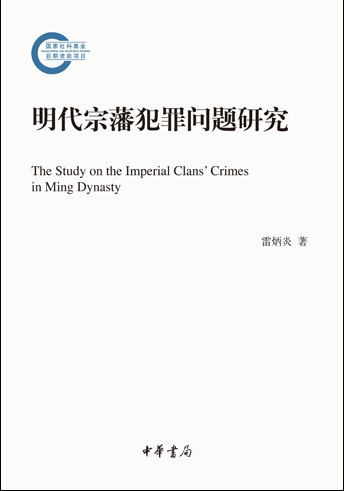Lack of checks on powerful princes led to crime in Ming era

The Study on the Imperial Clans’ Crimes in Ming Dynasty
Author: Lei Bingyan
Publisher: Zhonghua Book Company, 2014
In ancient Chinese dynasties, emperors held supreme power. Imperial clansmen who shared the same family name were also the most respected members of society. Born into positions of power and privilege, imperial family members were often the source of strife in the Han, Jin, Sui and Tang dynasties. Though Ming emperors established restrictions and precautionary measures, crimes committed by members of the imperial family still skyrocketed.
The Study on the Imperial Clans’ Crimes in Ming Dynasty by Lei Bingyan focuses on the crimes of princely families from an institutional perspective by exploring the political and cultural roots of this issue in order to reveal the evolution of social problems in the Ming Dynasty (1368-1644).
Zhu Yuanzhang (1328-1398), the founder and first emperor of the Ming Dynasty, was born to a poor peasant family and lost most of his family to famine early in life, so he showed great affection for his sons and relatives.
Upon taking the throne, he divided up the fringe areas of his empire into fiefs and gave one to each of his sons. They were bestowed the title of prince and were equipped with political and military privileges to prevent rebellions by officials. The book identifies this system as the institutional root of crime by imperial clans.
Despite the efforts of later emperors in the Ming Dynasty to strip princes of their lands, power and armies and implement legal restraints on imperial clansmen, crimes committed by imperial clans continued to emerge.
In the early Ming, imperial clansmen’s personal transgressions and rebellions were the major crimes. However, in middle and late Ming, crimes diversified, among which violations of clan marriage etiquette stood out.
The author argues that crimes of imperial clans, inadequate legal restrictions, marriage taboos, as well as clan population expansion and the economic burden together formed a complicated social issue.
Imperial clan crimes were closely related to the backward system of feoffment, under which individuals were granted land in exchange for pledges of service, and clan status changes, but there was one cause for each case. Incompetent and corrupt officials serving in prince’s houses, and provincial officials were often behind criminal activity. The upper imperial clans also extorted those that were below them.
From the perspective of social history, various factors, including geography and social position, affected whether or not clan members would engage in criminal activity. In middle and late Ming, lower-ranking generals and lieutenants were the main violators, and crimes occurred mostly in the northwest.
Imperial clans’ crimes had a great impact on politics, economy and social order, leading to chaos in the late Ming era.
The Study on the Imperial Clans’ Crimes in Ming Dynasty is a skillful integration of institutional and social history, offering us a glimpse at the social development of Ming dynasty.
Xu Xuemei is from the School of Cultural Communication at Shenyang University.
